Conference dynamics reflects real world
This conference has been designed using the five principles of Global Brain. There are four major key note speakers and five 'streams'. Every stream consists of a panel and a facilitated (moderated) workshop with the participants. Every stream is dedicated to one of the principles. The panel and the facilitator will use this principles as their starting point or 'Leitmotiv'. During the workshop, other principles will (re)surface.
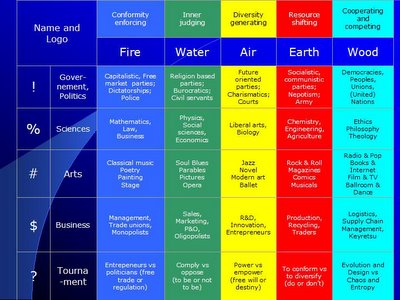
This matrix shows a map of the hidden dynamics of the conference design. For instance,
conformity enforcing can be associated with politics and governement. Inside this principle, we find the four principles again:
police to
enforce the enforcement,
civil servants to
judge the conformity,
courts to
innovate enforcement of conformity (this might seem strange, at first, because you may have thought that judges would be enforcers of 'judgers', but when I look at the process, I see a lot of innovative rules coming from courts; this is also the reason we've got this 'Trias Politica'), and an
army to
shift enforcement ('enforcing freedom' is a beautiful paradox). In the tournament we've got 'democracies', peoples, unions - like the United Kingdom - and, the silver back of tournaments, : the United Nations. Talking about tournaments!
OK, now look closer at for instance
police men and women: what will you find there? Some of them are only interested in
'the law', others more interested in '
research', others in
'justice' and - last but not least - most are just doing
their jobs of traffic control, serving the public.
Now, look for instance inside these
'detectives', the diversity generators of the conformity enforcers, for instance as they're being portayed in my favourite series NYPD: you'll soon notice that we find here.... conformity enforcing management, judging, social senior detectives, innovating young novices and, most of them, just hard working family men. The series is based on the confrontation of these different characters. And so on... .
This is a tentative map, and I'm sure you agree or disagree about some of the entries. Use it to locate yourself but don't buy the map.
Tensions, energy, power and the use of force
Smyth and Berg write "although there is minimal discussion of conflict in the literature on internal group processes,
in the literature on relations among groups, there is little discussion of anything other than conflict." (p 153, their emphasis). The
Lucifer Principle and
Global Brain are also full of conflicts, figths and power struggles. The paradox of power arises with the paradoxes of scarcity -
resource shifters - and perception -
inner judges - and is mediated by the
conformity enforcers. It is no coincedence that the word enforcer is being used. They contain the forces that shape groups. Tensions emerge from situations that lack resources, energies from the perceptions we have from each other and power from the excersice of power itself.
Power is more than an attribute of the relation between people and groups. In fact, power
is the way nature maintains
relations between entities. Power is process. In physics, every interaction between particles is associated with tension, power, a force (field) and energy. So, culture reflects nature, also in culture: power is the means and the goal. There is no surprise to find that the exchange of words and symbols is also part of power play. Every exchange between people and / or groups can only be understood by the relations between them, that is, by the power.
There is a difference between power and force. Both can be used to influence actions, but power also influences possible actions, while force influences actual actions. "The conceptual structure of
power differs from that of
force in its setting of one crucial parameter, namely
realized/latent, with force marked as realized and power marked as latent. The latency and diffusion of power requires it to be treated as residing in a
relation, rather than in individual entities. In contrast,
force, while it perhaps could be treated in the domain of relations, is more often considered as emanating from some individual entity and affecting some other individual entity." (http://way.net/dissonance/power.html#Conclusions)
The paradox shows itself when people define themselves in the light of these relations. In every group are differences in power. These differences may lead to internal conflict. Members lacking power, will accept a positions of lower status. In a lower status position, they'll make themselves more dependent of an authority, reinforcing the differences. As Bloom tells us, even our internal systems will start to turn out high or low status hormones. The authorities will have to show courage and creativity to remain in power. On the short run. another group comes in handy.
Between groups exist differences in power. A power conflict between two groups creates a convincing rationale for members of both groups to put aside the (internal) difference that might fragment it otherwise. This eases the job of the powerful in both groups, as they do not have to address the power difference in their own group. They gain power by exporting the inner tension into inter-group conflict. This is a rationale for competition between organisations as well as between nations.
Trying to help a lower status group doesn't solve this problem. A lower status group, gradually will view the old hierarchy as no longer legitimate and stable will reject the help by a higher status group, with its implication of dependency on the high status group, as threatening to its social identity. This reinforces the internal conflict, without solving the internal problems; the high status group, may offer only such help as will enable it to maintain its previous, but no longer accepted, social superiority. As the lower status group rejects the help, members of the higher status group will also percieve stronger internal conflicts.
This paradox can only be resolved by acknowlegding the role of power in relations.
Archetypal Dimensions of the Psyche
The chief disciple of C. G. Jung, analyst Marie-Louise von Franz uses her vast knowledge of the world of myths, fairy tales, visions, and dreams to examine expressions of the universal symbol of the Anthropos, or Cosmic Man—a universal archetype that embodies humanity's personal as well as collective identity. In
Archetypal Dimensions of the Psyche (details...) she shows that the meaning of life—the realization of our fullest human potential, which Jung called individuation—can only be found through a greater differentiation of consciousness by virtue of archetypes, and that
ultimately our future depends on relationships, (emphazis by me) whether between the sexes or among nations, races, religions, and political factions.
Spirituality and Global Brain
There is a deep inner connection between the principles of
Global Brain, our personalities - or better, our selfs -
and our spiritual path. Peter Tuft Richardson describes in his book
Four Spiritualities how the MBTI, the
Myers-Briggs Type Indicator - based on the works of the Swiss psychologist Carl Jung - nicely fits in with the four types of personal and spiritual development. These four types can be found in every religion, the Indian veda's, the Chinese Tao and the different types of Yoga. Richardson gives examples of spiritual leaders for every spiritual path. So it didn't came as a big surprise that the four principles of bacterial life also fit in. If we supplement the four principles by personality types, we get:

It is the same matrix as a previous post. In this picture I've assembled the four personalities (NT, NF, ST and SF). These are the four combinations of two required functions. We need a function that
perceives someting first and then a function to
judge the input in order to do something. The perceiving - or irrational - function is either through the senses (the 'real' eye) - or
Sensing or through the i
Ntuition (the 'mind's' eye). Recent studies of the working brain have confirmed this. Our seeing is more a kind of verifying what's already present or expected in our mind than a series of snapshots or a film.
The judging - or rational - function is either
Thinking ( 'objective') or
Feeling ('subjective'). We tend to 'think' that thinking is the best way to make a judgement. But in fact, feeling, our feelings, have already made an educated guess and the ratio only adds its arguments. This gives us the four combinations.
Every person has a certain predisposition. You cannot think and feel at the same time. There is not an even distribution of combinations in our population. 75% of the population are Sensing types, 25% Intuitive. There are three times as many sensing people, so that's why sensing is the norm. The Thinking and Feeling function is 50%-50% in a population, BUT 61% of men prefer Thinking and 68% of women prefer the Feeling function. Much of the popular literature on the differences between men and women can be traced back to these differences. In both men and women, the dominant judging function is combined with the Sensing, so for men ST (41%) is the norm and for women SF (47%). Overall the percentages are: ST, 38, SF, 38, NF, 12 and NT 12.
First of all, a preference doesn't imply that the complementary function is not available for an individual. Everybody can use their senses and their intuition, everybody can think and feel. But not at the same time. When we're under pressure, in an emergency, our preferences kick in. They are a kind of mental lifeboat.
Moreover, this distribution doesn't mean that one type is 'better' than another. They are just 'different qualities', qualities that are not always needed to the same degree. Use of a certain quality depends on the situation. Raising a child requires compassion, plowing requires action, running a company requires judgement and solving a paradox requires wisdom. However evolution is a smart gamer: these different percentages are the optimal combination for a population of hunters/ gatherers to survive. A tribe of only ST-men is, under pressure, less able to innovate, less able to experiment and not very compassionate. Their changes, united we stand, are slim. A group artistic, feely-touchy apemen, on the other hand, divided we fall, doesn't stand much of change either.
And thirdly: in our spiritual development (between brackets in the picture), we are required to accept, to learn from our lesser or minor functions. Denying yourself a quality, is denying yourself a part of fulfiment.
When we apply these findings to the Global Brain, we can see that 'Inner Judges' and 'Resource Shifters' are most common (76%) in a population. Makes sense in a time of peace and quite. The 'conformity enforcers' and the 'diversity generators' balance each other (12% and 12%), but because of the predisposition of T in men, the enforcers have an advantage in times of war and stress. Also makes sense.
In order to kick start a renaissance, we'll need all types. And we need facilitation to prevent pressure from building up. Because, in an unsafe environment, the weaker voices are silenced.
Consider the process, not the rule

`
Facilitating a next Renaissance´ is also an example of what is sometimes called a process intervention. We´re not going to state what principles we think are important nor are we going say that everything is relative. So, for instance, in our opinion, freedom of speech is not an absolute principle, nor is the opinion of every group regarding freedom of speech fine, for instance, because that is the way that particular culture works. Or, vice versa, respect for the faith or religion of others is not an absolute principle, nor should it be normal that showing no respect should be considered disrespectful. This could imply that somebody else is going to decide when you're being disrespectful - intentend or not - or that you have to conclude that every disrespect is good, as long as it is very passionate.
Every time, a group, a culture has to make up her mind. What worked in the past, may not work now; What works now, will not work in the future. Every intervention is made from a certain frame of mind, and will, after some time, also change that frame of mind. In a recent interview, Jonathan Safran Foer, writer of
Extremely Loud and Incredibly Close, said that the Jewish rules - and in fact any religion's rules - for food, should not be considered absolute nor should they be ignored. The deeper meaning of these rules is to make us conscious of the principle that we should never take food for granted. Every time we eat, the rules should make us consider that it is important to think about what we're eating and how we're eating. This is more important than any rule about the food.
So in this conference, it is more important to work together, to converse together and to make your own mind and find your own ways and means, than any specific result. As long as you don't eat the menu.
Background to the theme

The overarching theme of the conference will be “
Facilitating a next Renaissance”. As you know, a Chinese blessing is ‘May you live in uninteresting times’. Because in uninteresting times, there is peace. These are interesting times. We’re facing a challenge well worth witnessing.
We're in an age of technologies that expand the range of human powers far beyond those Leonardo was able to imagine. For hundreds of years Western men and women have been forced to smother most of their interests and curiosities to perform mechanical labor.
But in advanced nations, the age of mechanical labor is over. And specialization is no longer a necessity. Using all of your curiosities simultaneously is more than a personal indulgence. It's a gift to society. It can maximize a culture or an organization's collective creativity and problem-solving-power.
Today, technologists and executives need the skills of artists. And artists need the skills of executives and technologists. In Leonardo's day, only a handful of humans could call themselves Renaissance Men.
Today everyone with a reasonable level of intelligence and curiosity MUST do his or her best to be a multi-disciplinary maker of The Next Renaissance.
Those producing the MusicalLogic Conference are dedicated to provoking innovative partnerships that go outside the bounds of industry to produce exciting and powerful relations through diverse cross networking. A main idea being to cultivate knowledge combined with creativity to inspire new discoveries and new creative business opportunities for those involved. “Crossing Boundaries by Crossing Disciplines”.
An impressive line of speakers AND attendees

Mass behavior scientist and ex-rock star maker
Howard Bloom who has been called the Newton, Darwin, Freud, Einstein, and Buckminster Fuller of the 21st century. He’s the author of The Lucifer Principle, Global Brain, and working on a new book, Reinventing Capitalism: Putting Soul In the Machine.

British-born, US-based
Martin Lewis, a fabled renaissance man with a 35-year career as a humorist, producer, writer, TV & radio host, publicity & marketing strategist - and pioneering organizer of human rights benefits. He hosts his own national daily radio show in the US.

Live video-feed from New York we will have Award winning author, teacher, and documentarian
Douglas Rushkoff who focuses on the ways people, cultures, and institutions create, share, and influence each other's values and whose new book “Get Back in the Box-Innovation from the Inside Out” is quickly gaining recognition. He has written ten best-selling books on new media and popular culture that have been translated to over thirty languages.
Rushkoff has been announced winner of "Neil Postman Award for Career Achievement in Public Intellectual Activity."; Exit Strategy, selected by MacGills as one of the 200 most important books of 2002. Coercion wins the 2002 Marshall McLuhan Award for best media book!

Science and business consultant for major Dutch TV productions and one of Holland’s best science writers,
Marcel Roele. He has written books on ethology, sociobiology, behavior genetics, differential psychology, psychometrics, and aspects of anthropology, political science and history as far as they relate to cultural evolution.
Also attending, award-winning classical composer
Octavio Vazquez who’s been quoted as "one of the most outstanding musicians of his generation...one of the foremost composers of classical music...a burning torch for the 21st century". He has written extensively in every genre, and his music is performed throughout the world by some of today's most exciting ensembles.
We’re also expecting prof. dr.
Slawomir Magala, professor of Cross-Cultural Management of the Erasmus University Rotterdam, who coined the term agora – Greek for market and discussion room – for bridging cultural differences.
I'm a bassoon?
Bill Harris (
http://facilitatedsystems.com/weblog/) pointed me to this site. If you were in an orchestra, what instrument would match your personality?
Perhaps an idea for every participant to do this quiz?
If you were in an orchestra, what instrument would match your personality?created with QuizFarm.com
Sounds as a new spring...
Amsterdam, March 25-26 Spring is in the air, March 25-26
This looks like a time of crisis, chaos and clashing civilizations. How can we constructively intervene to improve this dire situation? How to let the Lucifer Principle,
the dilemma between ‘good’ goals but ‘bad’ means, work in favor of us all? By putting the expert at work: you!
Your future needs YOU! The intention of our conference is to offer participants a change to work, learn and network, not only with renowned people, but also with each other. A new Renaissance is, as always, in the network. The content of the topics will be decided on by the participants. The solutions to the content will be decided on by the participants. The result of the conference is in the hands, minds and hearts of the participants. Our goal is to let them (= you) be inspired to take actions to improve their own situation, work, study or ambition:
food for their soul.
Culture, politics, science and business will merge in the new cutting edge conference. Never before has a conference been designed to let participants deal with the most important issues facing our open society: bridging disciplines to put innovative and culturally relevant ideas into action A diverse cast of cutting edge international speakers with experience in the worlds of science, music, human rights, television/radio/movies, technology, business, and government will gather at Amsterdam’s Felix Meritis Cultural Center, crossing disciplines to emerge innovative and culturally relevant ideas into action.
Hosted by the music network MusicalLogic, the conference not only has a intelligent design, an impressive array of international speakers and some of the best facilitators Dutch and International facilitators but also has a cultural allure by hosting musicians and other artists.
How Howard thinks about the theme
All this sounds good.
Yes, Making The Next Renaissance is a very important theme to me. It also resonates with many others, Doug Rushkoff being high on that list. And it's what Omnology is all about--giving kids permission to be Renaissance Men and Women in an age of tools that make us far more than Leonardo's techno-limited human beings. I think it's a superb theme. Howard
Communities of Practice
Synchronicity is the middle name of my mail box. I got a post from Rosanna Tarsiero in the Group Facilitation List, directing my attention to
Communities of Practice, CoP's.
Halbana Tarmizi and
Gert-Jan de Vreede published a paper called "
A Facilitation Task Taxonomy for Communities of Practice" in the Proceedings of the Eleventh Americas Conference on Information Systems, Omaha, NE, USA August 11th-14th 2005.
What are these CoP's? They define:
"
Communities of Practice (COP) are social structures that focus on knowledge creating and sharing and explicitly enable the management of knowledge to be placed in the hands of practitioners (Wenger, 2004). COP have been identified as playing a critical role in the promotion of learning and innovation in contemporary organizations Swan, Scarborough and Robertson, 2002). However, establishing and sustaining COP within organizations is not a trivial task."
We can agree with this. There is, they say, an increasing interest in institution to create these CoP's. But we intend the participants of ABC to leave with a sense of purpose, a purpose to put their ideas into communal practice. We intend to learn people how to create a CoP as a facilitator. How? They propose a four stage model:
"Therefore, our life cycle stage model for COP has the following four stages:
1. The potential stage, when potential members or sponsors explore the possibility and desirability of setting up a COP;
2. The building stage, when the community is set up but has not officially started, e.g., it may run as a pilot community;
3. The active stage, when the community has officially started, takes off, shows rapid growth, and becomes a routine part of the organization; and
4. The inactive stage, when the community may exist, although the members are no longer active and no longer use the community."
So, the ABC is now in stage 1, a kind of
Winter; the conference itself will be stage 2, it isMarch, so
Spring is in the air. The participants will be prepared for stage 3:
Summertime. Stage 4, of course, is the
Autumn stage. Here the authors make a mistake: there is still activity. It is reaping the fruit of the CoP.
They also have some information on assisting roles for CoP's. They tell us (emphasized by me):
"In a case study of COP at 18 firms, Fontaine (2001) identified the following key roles within a COP:
The ‘
facilitator’ role, which is the most time consuming role with up to 53.4% of a person’s assigned work time per week, followed by
the ‘
admin/event coordinator’ role and
the ‘
technologist’ role with 26% and 25%, respectively."
So, that is interesting - and also the division of labour for the conference. What is the facilitator role?
"According to Fontaine (2001, p.18) the facilitator role is responsible to “network and connect community members by encouraging participation, facilitating and seeding discussions and keeping events and communities activities engaging and vibrant” (p.18). It appears that a facilitator can play a crucial role in addressing the challenges in stablishing and nurturing a COP (Fontaine, 2001; Kimball and Ladd 2004)."
And:
"This leads to a number of important questions: What exactly constitutes the facilitator role?"
Here they become a bit technical - or is it scientific - and they start to mention model after model. It seems that this table is core: (click for an enlargement)
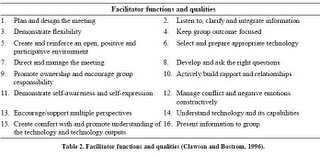
It looks more complicated, than it is, I think.
For more information, here is the link:
link to article More on CoP:
http://www.funderstanding.com/communities_of_practice.cfm
Why facilitation? And what - if anything - is it?
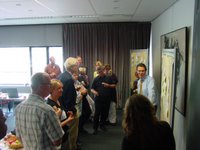
Secondly: why facilitation? Concordance, I'm aware of that, is not easy. It requires, what Prof. Magala calls
'Cross-cultural Competence'. But most of the times, we've identified with our role, our position in the group. We try to blend in and cause no disturbance - consensus, you know. Culture can stiffle.
Every now and then, a group will have to stop and reconsider, see where they're going. Then we need to bridge the differences in opinion again. This is best done in, what I like to call, facilitated conversations.
In these conversations, these breaks, usually, there is an expert who gives his informed opinions, his insights, shares his knowlegde. Then the participants con-verse, they exchange their opinions on the expert knowledge, reflect. A facilitator usually only manages, guides, supports, moderates this process, the interactions and not the content, the subject of the conversation. In a not-facilitated conversation, the Lucifer Principle might kick in more easily, and the expert might take the role of the silver back or the leader might cut a discussion short or the leader is uncertain, but is unable to say so without loosing face.... Either way, the expert takes over the process, or he or she is being misguided by the bath of reflected glory.

Why use facilitated conversations? Because different opinions in a group do create tensions. We do not agree with each other, because we're alle different and have different objectives. A soon as the common means do not or no longer suit our particular goal, we tend to get frustrated. Tension will be released, it is an old law. I think that the Lucifer Principle is like the action - reaction type of release. Frustration builds and the energy is directed towards 'the other'.
There is a potential to use these tensions creativily, not destructively. These tensions can be channeled, guided towards a common decision, towards the goals and means we do have in common. Facilitators, in my opinion, are able to contain these tension, these energies, for a short while. Not unlike a catalyst.
Facilitator is a role, not a function, not a job nor a profession (although you can be a professional facilitator). Facilitator is another word for moderator, process consultant, coach, trainer, mediator. Even a consultant and a manager will facilitate now and then.
Everytime you're more concerned with the process, the relations between people, than the content, the goal,
you are facilitating. Facilitators are
catalysts for conversation. A catalyst speeds up a (bio)chemical process - either splitting or bonding - , without being used itself. The same is true for facilitator: speeding up a process - of agreement or disagreement - , without being used herself. It is nothing, really, just a small service.
Facilitated conversations ==> concordance
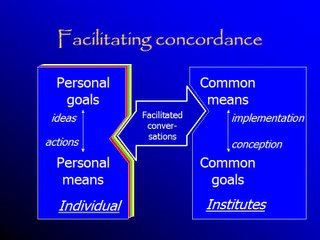
First, what do I mean by concordance? With
concordance (Dutch: concordantie) I mean
working in harmony or harmonious co-operation. Like the British-French aeroplane 'Concorde'. I've started to use this word, because I developed a small dislike with consensus. I noticed that I didn't like, even didn't need and later on, didn't want consensus in a group or team. Somehow people think that you have to agree with each others to obtain a common result. I think consensus is not needed and might - on the long run - even be harmful for the result, because it tends to destroy diversity. And,
Ashby's Law of the prerequisite variety (more ...) , you need diversity to able to steer, to manage, to act in complex environments.
So, people are all different and we need these differences in a team, if we're going to acheive any goals in a complex environment. We only need to # agree to disagree but disagree to part # (10cc, The Things We Do For Love). In my experience, when you start out on insisting on agreement (on goals or means), you either don't move at all (no agreement on goals) or, you move in circles (no agreement on means): a lot of commotion (! sic) without any progress. Everyone takes on a position, and - Lucifer Principle - the position with the most power wins and gets most of the votes. Or, - democrazy - the other way around. Consensus becomes a force that will drive the group apart, creating heretics and schismatics. The group will be running very hard, but make no progress. It is a closed system, attaining equilibrium, at the expense of chaos. Chaotic inaction follows structure.

But what if there is no consensus? When the differences in opinion are exchanged, people may notice there are some things they all agree upon. When people know of each others opinions, know where they agree and where they don't agree, they usually can decide to make a move none the less. Then a group can be on its way and develop a goal while being on the move.
Improvement is only the intelligent goal. There might not be a lot of common goals, but there will be a lot of progress. True, open, democracy needs an acceptance of different opinions. An open system, using chaos for structures to emerge. Structured action follows chaos.
The beauty and the nerd
The other day I've been talking with my daugther. Why are there much more men studying an exact, beta, science (physics, mathematics, engineering ...) than girls - at least, in The Netherlands? I tried to use the Lucifer Principle ("Bad boys always get the best girls"): is it because boys are more competitive? No, that's why computer games are more popular with boys than with girls. Is it because boys are smarter, more intelligent? I think not: usually girls tend to be more logical. Any suggestions?
There's something rotten in the state of ...

Danmark? The West? Islam? Neither? No, the world! The riots around on the cartoons is a good example of the ideas espoused in the
'Lucifer Paradox' and
'Global Brain'.
First, the debate is
NOT about the cartoons, but about group relations, power. The issue is being called '(lack of) respect', so lets use that word.
The word respect comes from 'looking back'. What the Islam seems to ask is positive feed-back, a good, respectful, look. But respect for what? That it is as large a religion as any other? That it is the only true faith, as all the others. That it is a religion of 1 billion, mainly poor, people governed by a very small elite of extremely wealthy people? The fact that it is far from a modern, open society? The fact that it doesn't much respect other religions or non-believers?
And will respect help? No. Why not? Because it reïnforces the differences in power. In the world of Islam people think: '"West" is superior (economically, technically, socialy, artistically, politically, ... ) to "Islam"'. And in the west people think so too. Now, the Lucifer Principle states that this is unacceptable for Islam. In fact, The West will - in the eyes of The Islam - never respect Islam until Islam has conquered the West. The more West says it respects Islam, the more it hurts.
Now, watch the dynamics to this situation; it is very interesting, because most of it happens 'unconsciously':
The young have to rebel against their parents - by force of nature. Inner Judges of young people - most of the older people live in 'wish you were here's ' quiet desperation - conclude that this unequality is an unaccaptable situation. Having weak parents, or parents who deny them love, they look for a strong image they can project their feelings of frustration on. The anger is projected on 'West'. Psychologically, "West" obtains the role of the bad father. Inner Judges will seek those who'll support their rebellion: most of them young, but some elders who are bearing a crunch....
Conformity Enforcers get most of the resources - Resources Shifters just shift resources based on the opinion of the inner judges - and the religion gets more fundamentalistic. Feelings get more repressed, noteably sexual feelings. Might this be the logic behind enforcing the rule of women wearing the headscarf? This again adds too the feelings of frustration. This movement is mirrored in West, which in turn, feeds back to the Inner Judges in Islam: see, we were right in not beleiving the unbeliever. More and more resources are shifting towards fundamentalism, in schools, in training, in thought, in money.
Some Islamic Diversity Generators start to experiment, some try to find a new interpretation of Islam, but most will try to test the superior "West"-male. They start with some attacks, try to draw out a reactions of the male. Sometimes it works, sometimes it doesn't. Please note that there is no use in retaliation and killing terrorists. This only proves the inner judges that the terrorists were 'right'. At first West ignores much of the attacks. This is proof of the weakening of West. But after a while, "West" picks up the bait and invades Pakistan and - o joy - Iraq. Now West is trapped. Not because Islam can defeat West - not yet. But because West proves it cannot win. And that's enough for Resource Shifters.
More and more resources flow towards the Diversity Generators who support Conformity Enforcers. The voice of the opposition, in Islam as well as in West - let's cooperate with each other, make peace, build bridges - grows weaker. Winner takes all. West start to shut Islam out. Interesting: trying to prevent the flow of resources, only forces it to go 'underground' and reinforces the resistance against 'West'.
There is an interesting side-effect for the Saudi elite: they do not have to share their wealth with their poor. In effect, West is the largest contributor to - watch this: Israel, their arch enemy, reïnforcing their 'bad' nature, Egypt (yes, who spends it on ... weapons) and - from Europe - Palestine. Now, will Islam be grateful? Yes, when we're dead. See the cat? See the grin?
So there is no clash of cultures. There is just a principle at work, working bindly as it has done for over 3 billion years. If nothing happens, it will end in war. "But", somebody said to me, "China, East, will support West; it says it does". Yes, it says so, but China's tactics are smart: they'll just let the others do the fighting and grap what's left over.
Until recently, we (West and Islam and East) were powerless. West has been lured by the same phenomenon as Islam: the idea of leadership. West thinks the key is leadership. Look around, there are a lot of talk and books and courses and much training on leadership. The inner judges think it is lack of leadership. Diversity Generators turn their attention to leadership, culminating in the recent 'Synchronicty - the path to inner leadership'. Inner leadership, I wonder, who will be lured by this word? Or: 'The seven habits of effective leaders'. Effective? Why? Because that gets attention from resource shifters. The inner judge use this tactic because that is how the Lucifer Principle works. The 'normal' response to threath is reïnforcing leadership - any leader will tell you so. But classical, normal leadership IS A TRAP. West will either get a leader who'll stifle opposition and confront Islam ÁND reinforce the difference in power, making the inevitable conflict worse. Or West gets a leader who'll try to appease the opposition - and perhaps even promote disarmement - and thereby reinforces the ideas we're weakening. Making the result of the inevitable conflict worse. No win/win either.
Until Bloom came, we were brainless. Because we didn't quite know how this worked. Now we've been enlightened, we can know how to act, what might work. First of all, we cannot undo the logic of the Lucifer Principle. Secondly, we cannot undo our nature and our culture. We're in this tournament, with four principles, whether we like it or not. If you cann't stand the movement, get out of the carrousel. Think, Tom Poes, of a cunning plan. And that's what we've come up with.
I'm at fans' fanatism: video with Bloom and Lifton (met NL ondertitels)

We need to be fans of fanatism: Bloom about the most important drug for kids,
'rightous indignation'. The video had been shown on Dutch television by the VPRO and is subtitled in Dutch. This video is again important in the light of the actual events in the world. Video is on page:
Bonobo-bo
Lucifer principle
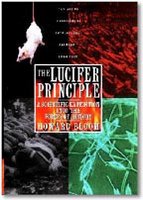
Bloom ends his book
'The Lucifer Principle' with a chapter called the luciferian paradox: good and bad are the two sides of the medal of life. In my view, it is the paradox of creation revisited. We tend to think of creation as something good. Marketing people know that you can only sell something that is 'new', or 'improved', or 'with added power', and even reïntroduce the good'ol stuff as 'classic'. But every new creation is also the destruction of something old. So, perhaps to come to grip with it, we tend to think that old is bad. Bring in the new; the destructed had it coming. Most of the time we assume that there is a dilemma: either have something good ('create!) or something bad ('destroy'). We destroy something (bad) by creating something (good), therefore, we think, it is also the other way around: we can make something good, by destroying something bad. But we cann't. This is no dilemma, it is a paradox. Destruction is the child of creation and creation begets destruction. Lucifer means bearer of light, and this Lucifer has been thrown into the dark. But in the dark, the light only shines stronger.
The Luciferian paradox is also much like the Jungian paradox: the closer you get to the light, the larger the shadow. Good is the opposite of bad, not the negation. The negation of 'bad' is not 'good'; the negation of 'bad' is 'not bad'. The negation of 'good' is not 'bad', its is 'not good'. So you cannot tour continuously from 'good' to 'not good' = 'bad' to 'not bad' = good again. There is a gap the size of an endless regression. This is the conflictuous nature of paradox, this is what keeps us stuck and drives us.
This, I think, is the link between "The Lucifer Principle" and "Global Brain": the Luciferion paradox, the two sides of life, good and evil, alternate and 'causes' the four principles and the tournament. The endless regression of chasing our own tale (pun intended) is all in there is.
Synopsis ABC

The
Amsterdam Bloom Conference (ABC) (location:
Felix Merites, Amsterdam, dates: 25-26 March 2006) is being organized to put into practice ideas from Howard Bloom's
'Global Brain' and ourselfs. We intend to induce new, creative, innovative, pashionate and improved ways to your own work, based on priorities in current issues, and facilitate the development of a new culture. And a great party. We offer a frame work were participants can share
ideas,
emotions,
intuitions,
principles supported by expert panels and key note speakers (amongst others: the one and only Howard Bloom). Moreover, we want to deliver a stimulating environment where people from different cultures, exemplified by arts, business, politics, science, and other can gain competence in colaboration. We believe that facilitated conversations are the best way to support translation of personal meaning into institutional knowledge. O, yeah, not to mention the party!
Edgar Lanting, Hans Konstapel, Jan Lelie, Tom 'Poes' den Hoed, Josée Rijke, Menna Kruiswijk. Feel free to contact one of us or react by dropping memo. And did I mention the after party?
Putting the mean into meaning.
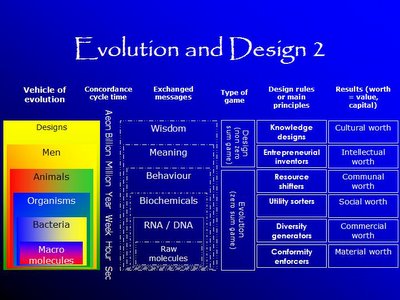 Note on messagesRaw molecules including water, salts, amino acids and perhaps ATP
Note on messagesRaw molecules including water, salts, amino acids and perhaps ATP
(Bio)chemicals including the above and pheromones, hormones and also RNA and DNA
Behavior including the above and (single and double loop) learning
Wisdom includes all of the above and accepting the consequences
Culture is the resulting order from the exchange of all of the above together with the depletion of resources (increasing entropy).Evolution is emergent change, design without any intention; design is intended change, evolution without random emergences.For the first timeperiod in the history of evolution (at least in this part of the universe), we're
aware of our own innate design principles. We're able to look at the designs and decide to start aplying other rules. Rules regarding justice, rights, grace and fairness. Our innate natural rules, giving rise to flight, fright, dependency and bonding, will be complemented by cultural rules.
In The Netherlands there is currently a debate over evolution or intelligent design. It is not either-or, it is an example of the excluded third: it is both! Evolutionary speaking, we are evolution becoming aware of its own blue prints, it own creating, its own rules. And some of them are nasty (see:
'The Lucifer Principle' by Howard Bloom).
At first, setting the rules ourselves seems to be a good idea: we're responsible for our own success! It is me, myself and I. This nicely ties in with our innate nature: i'm the man, we're the crown on creation!
BUT soon it gets worse when you start to realize the implication of making up your own rules, using the new knowledge: when you're designing your own rules, making your own designs, it implies that you're responsible for the bad results too. If their (o no, not yours) intentions were wrong, OK: suits them. So, when they fail, it probably was their wrong intentions. But when your good intentions deliver unintended bad results: that is worse. When you're aware, you can be blamed and shamed when you fail, you'll have to answer to the judges, to your peers. So shift the blame.This is no longer a Lucifer principle, this became a 'Kain and Abel-principle'.
Now what? Move towards the source of the anxiety: behave responsible, even when there are unintended consequences. Resolution will come when you facilitate the development of your group, your network. And that is why, I think, we all (the organizers as well as the speakers, the panel, the facilitators upto and including our sponsors and the participants) will take full resposibility and liability for this conference. Putting the mean into meaning.
A Matrix as template
We're all different. Species are different and within every specie every specimen is different. Some, are more different than others. But these difference are all assembled from the same construction materials and the same principles. Lets look at the
construction materials first. One of these construction materials used are cells. We have different types of cells, in fact, all cells are different; but they have been assembled from the same kinds of molecules, biochemicals, and the same biochemical rules. One of the kinds of molecules are proteins. All proteins are different, but they have been assembled from the same building blocks, using the same type of programms. Proteins are build from amyno-acids and the programms are, of course, written in the language of neucleotic acid (DNA andRNA). So, although we're all different, we use the same elements, molecules, macro-molecules and scripting language.
Secondly, we also adhere to
the same principles. It doesn't matter if you belong to the genus of bacteria, plants, animals or men: we're all using the same principles for growth, development, evolution. Not only the same materials, but also the same rules. In fact, we even call bacteria growth in a petrie disk: 'a culture'. Just like what we call the folks that build Jericho, Thebe, Athens, Rome, Amsterdam or New York: a culture. We're all (and I mean all living beings) in the business of creating cultural value, capital, or, the word I like, worth. Bloom named 5 principles in his book 'Global Brain', which are also the 5 streams of the conference:
- Conformity enforcers, Politics, Analytic, Blue
- Inner judges, Science, Influential, Green, - Diversity generators, Arts, Assertive, Yellow,
- Resource shifters, Commerce, Evaluative, Red,
- Cooperating and competing, Confrontation, Inventive, Azure,

Funny and not, Will McWhinney proposed 4 kinds of reality perceptions in his book
'Creating Paths of Change'. And the same archetypes can be found in Jung (symbols), the MBTI (personalities) and, as Tuft-Richardson discovered, in our four spiritualities. Hardjono found them in the dynamics of organisational change, again four. These principles are not only in our genes, not only in our myths, our tales, our thoughts, our memes, they're in our organizations and society. They're the manifestation of archetypes. Just like an architect designs, but doesn't build a house, the archetype designs but doesn't build our life. They're common knowledge, sometimes refered to as collective subconscious. And that is why I proposed to apply these rule in the design of the conference.
In this pilot Amsterdam Bloom Conference, the 5
principles of Global Brain, of social, learning networks have been
applied again and again: they're in the overall structure of the two days, in the key-notes. They're in the five different streams of workshops and inside the workshop they'll be in the sub groups and inside the sub-group, there is you, the participant, bringing the principles too. And inside your head, in your brain, the same rules are applied, over and over again. Not only that, but the building, Felix Merites, has been designed as a meeting place for business, art, science and politicians. And Amsterdam, the big city built on poles, birth place of Spinoza, the god-father of Enlightment, is and has been a focal point for these principles.
In fact, the 5 streams can be looked at from two axes, making a matrix that looks like this:

>
The Design for the agora
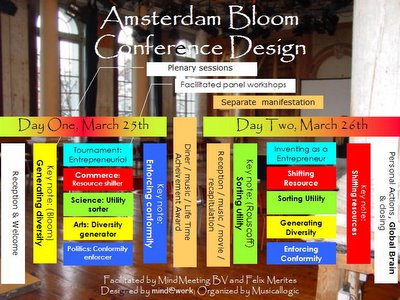 Note on language/ nb : de bijeenkomst zal gedeeltelijk in het Engels (key notes en 2 workshops) en in het Nederlands (3 workshops) gehouden worden. In kleine groepen kan natuurlijk altijd Nederlands gesproken worden (of Pools, of Hongaars, of Duits of ....)
Note on language/ nb : de bijeenkomst zal gedeeltelijk in het Engels (key notes en 2 workshops) en in het Nederlands (3 workshops) gehouden worden. In kleine groepen kan natuurlijk altijd Nederlands gesproken worden (of Pools, of Hongaars, of Duits of ....) Here is a picture (
click on it for an enlargement) of the design of the
Amsterdam Bloom Conference 2006 (ABC).
On
Day One there will be a
'search conference' for the issues that matter to you, the participants. A
'diversity generating' key note by
Howard Bloom is scheduled. Then, guided by the five principles specified in
Global Brain, there will be input from panel members. These work shops will be facilitated (or moderated or supported) by skill ful and experienced faciltators. In small groups, the input by the panel (amongst others Marcel Roele, Octavio and Martin Lewis; perhaps Slawomir Magala) and key note will be 'consumed', 'transformed', 'used' or whatever word you prefer by the participants. This may include working out side the building. The conclusions will be discussed, first within the work shop and later in a plenary meeting. A
'conformity enforcing' key note (perhaps Jack Healey) will set the stage for the evaluation: what issues are now most important.
In the
evening Day One there will be a diner, or, most probably, diners in the several rooms of Felix Merites. The diner and music / dance party will be open for non-conference participants too. For participants there will be an opportunity to invite a partner.
The
Second Day will start with classical music and, probably, a film or video documentary. The second day is called
'Innovation Process'. After a recapitulation and a
'inner judging' key-note (we're expecting Douglas Rouscoff or else Martin Lewis) , participants will be free to choose one of the issues raised on Day One. This might be one from the same stream, but it might also be a different one. The goal is to decide on personal actions, actions you yourself can execute, that relate to your current work or study or company or acivities and to one (or perhaps two) of the issues. Again, in facilitated works shops, you will be given the opportunity to meet with panel members and participants to talk about
the good,
the bad and
the ugly, about their and your ideas. Again, in a plenary meeting, the global trends and directions will be presented. A key note directed at
'resouce shifting' can stimulate even more. Some of your intended actions could be supporting the ideas of others. This is why we scheduled a "
Gobal Brain" event: there will be an
agora (= Greek for market and meeting) to exchange plans and intentions with resources. Then there will be a small closing ceremony and an evaluation of this pilot conference. These days will also be learning events for us.
We are planning to have reporting options about the ABC, that can sustain the developed issues and plans. If you have any suggestions or ideas, do not hesitate to contact us. For instance:
edgar_at_musicallogic.nlor
info_replace_at_mindatwork.nl
Why our future needs YOU!

"We need to stare a blunt fact in the face: Many of today's corporations are creatively and morally asleep. But you and I can wake them in a most ironic way—through a strange-but-vital upgrade in the richness of our lives. We can re-perceive the tale of capitalism's rise. We can lay out a new and far more insight-saturated story of our origins—a factual creation myth. And we can use this genesis story, this re-perceived tale of our history, as a key to the quandaries of work and daily living. We can use it as a cornerstone of a new view of our future in a world of instant change. " is a quote from
'Reïnventing Capitalism' Bloom's forthcoming book.
Your Amsterdam Bloom Conference has been designed to lay this cornerstone, to create a steppingstone, to build a stonebridge of Babel, to the future you and I want.
http://www.howardbloom.net/reinventing_capitalism/
TheCommunicationsLabs works!

The power of a network can be overwhelming. I - Jan - had a meeting with Josée Rijke on a completely different subject and was redirected to her by another node in the netwerk. It so happened that we started to talk about this new venture, the ABC, and she recognized in us the pasion that drives her own organisation: a network of entrepeneurs called 'the CommunicationsLab'. One of these labs is called CongressLab. We're happy and proud to announce that Josée and Menna Kruiswijk (see picture, Menna while desiging the conference) are now supporting us with concrete advice and hard work.
http://www.thecommunicationlabs.nl/CMS/
Looking for adoption

Our main bottle-neck now is resources. We have a man, a plan and a channel (? where did we hear that earlier?), but not enough funds. So Edgar and Tom (see picture, Edgar on the left), we, together with José and Menna, (who will organize the conference regardless), decided will start implementing actions to get sponsors. One or two of them will be offered a special status: that of adopter of the conference. All sponsors will be required to send at least one person to the conference, because we do not need their money only: we're seeking commitment, pashion, drive! If you have any suggestion, do not hesitate to react.
An agora for Cross-Cultural Competencies (ook in NL)
"
Cross-cultural competence allows for successful bridging of differences in identifying, naming, prioritizing and implementing values. The growth in the complexity of interconnectedness of contemporary individuals, groups, organizations and entire societies requires frequent reflection on 'what we are striving for' (culturally articulated values and beliefs) and which 'equipment' (organizational determind managerail instruments) we need in our striving." writes prof. dr. Slawomir Magala (
http://www.onderzoekinformatie.nl/en/oi/nod/onderzoeker/PRS1239421/ ) in his recent Cross-Cultural Competence. With other words, the complexity of our network forces us, again and again to restablish priorities in ends and ways. This is what we intend to do in the conferences. We aim at hosting an agora, a Greek word for market and meeting place. Here participants can exchange the 'prices' of their concerns and trade them for the 'values' of their solutions.
Met andere woorden, de complexiteit van ons netwerk dwingt ons om, met enige regelmaat en steeds opnieuw, de (prioriteit in) waarden en de samenhang met de middelen (= acties) te bespreken.
Dat is wat we op deze conferentie met elkaar, met jullie, met u, met jou willen doen. Welke waarden hebben we? Wat kan ik doen om betekenisvolle resultaten te bereiken? We stellen - in lijn met prof Magala - voor om dit te doen op een agora = een Griekse markt en vergaderplaats. Op deze markt prijzen we onze ideeën, meningen en gevoelens aan. We komen een 'prijs' overeen en nemen de waarden van producten, onze voornemens mee naar huis. De waren worden aangeprezen door key-note sprekers, zoals Howard Bloom, terwijl de vergadering wordt ondersteund door professionele facilitators.
 This matrix shows a map of the hidden dynamics of the conference design. For instance, conformity enforcing can be associated with politics and governement. Inside this principle, we find the four principles again: police to enforce the enforcement, civil servants to judge the conformity, courts to innovate enforcement of conformity (this might seem strange, at first, because you may have thought that judges would be enforcers of 'judgers', but when I look at the process, I see a lot of innovative rules coming from courts; this is also the reason we've got this 'Trias Politica'), and an army to shift enforcement ('enforcing freedom' is a beautiful paradox). In the tournament we've got 'democracies', peoples, unions - like the United Kingdom - and, the silver back of tournaments, : the United Nations. Talking about tournaments!
This matrix shows a map of the hidden dynamics of the conference design. For instance, conformity enforcing can be associated with politics and governement. Inside this principle, we find the four principles again: police to enforce the enforcement, civil servants to judge the conformity, courts to innovate enforcement of conformity (this might seem strange, at first, because you may have thought that judges would be enforcers of 'judgers', but when I look at the process, I see a lot of innovative rules coming from courts; this is also the reason we've got this 'Trias Politica'), and an army to shift enforcement ('enforcing freedom' is a beautiful paradox). In the tournament we've got 'democracies', peoples, unions - like the United Kingdom - and, the silver back of tournaments, : the United Nations. Talking about tournaments!
























